October 27, 2015
Edited by David Sanders
Specimen Days
1651 – Jan III van Foreest, Dutch lawyer/poet/mayor of Hoorn, dies.
1674 – Hallgrímur Pétursson, Icelandic poet (b. 1614), dies.
1892 – Victor E van Vriesland, Dutch poet/critic (Mirror of Dutch Poetry), is born.
1893 – Johan G Dancer, Dutch poet (Meetings), is born.
1914 – Dylan Thomas, Swansea Wales, poet (Child's Christmas in Wales), is born.
1932 – Sylvia Plath, American poet (Colossus, 3 Women, Bell Jar), is born.
1938 – Lascelles Abercrombie, English poet/critic, dies at 57.
1958 – Frederik Gerretson [Geerten Gossaert], historian/poet/politician, dies at 74.
1991 – George Barker, English poet (b. 1913), dies.
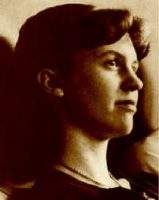
In burrows narrow as a finger, solitary bees
Keep house among the grasses. Kneeling down
I set my eyes to a hole-mouth and meet an eye
Round, green, disconsolate as a tear.
Father, bridegroom, in this Easter egg
Under the coronal of sugar roses
The queen bee marries the winter of your year.
—from “The Beekeeper’s Daughter” by Sylvia Plath (1932-1963)
Sylvia Plath was born this week in 1932.
World Poetry
U.N. Rights Experts Urge Qatar to Free Man Jailed for Critical Poem
United Nations human rights experts on Tuesday urged Qatar to release a poet jailed in 2013 for 15 years for reciting a poem that praised the 2011 Arab spring uprising in Tunisia and criticized the country's crown prince. The tiny, gas-rich, absolute Gulf monarchy tightly controls freedom of expression, with self-censorship prevalent among national newspapers. It has no organized political opposition. "The arrest, detention and sentencing of Mohammed al-Ajami in October 2013 seem to be solely related to the peaceful exercise of his fundamental human rights," said the U.N. Special Rapporteur on freedom of expression, David Kaye, in a statement.
Myanmar: Writer on Run from Police after Posting Poem about his Tattooed Penis on Facebook

A young Burmese poet has gone on the run after joking on Facebook that he had a picture of the president tattooed on his penis. Maung Saungkha, a 23-year-old poet from Myanmar's capital Yangon, told The Irrawaddy news site that he has been in hiding since the beginning of the month after posting a poem on social entitled Image, which read: "I have the president's portrait tattooed on my peni/How disgusted my wife is".
Protecting Cornish Poet's Legacy
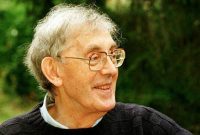
A development officer has been appointed by the Charles Causley Trust to preserve and promote the legacy of Cornwall’s favourite poet both in the Westcountry and beyond. Jennifer McDerra is based in the poet’s home town of Launceston and will deliver the Spark To Flame project – which takes its name from Causley’s poem, Kelly Wood – with a view to establishing a lasting legacy for his significant contribution to the arts.
A young Burmese poet has gone on the run after joking on Facebook that he had a picture of the president tattooed on his penis.
Recent Reviews
Two New Books Give Poet John Wieners an Overdue Look
by Michael Andor Brodeur
“I always had a wild, weird voice,” the poet John Wieners once told an audience in San Francisco. That was 1990, and he was referring to his speaking voice — which he joked Martha Raye had left to him in her will — but he could as well have been accounting for his odd, belatedly lauded place in poetry at that moment. Wieners, the self-described “Boston poet’ who was raised in Milton and died in 2002 at Mass General, figured estimably into that insta-canonized cadre of Donald Allen’s landmark 1960 anthology, “The New American Poets,” but he never quite achieved the stickiness of his fellow News — John Ashbery, Allen Ginsberg, LeRoi Jones, Denise Levertov, Charles Olson, and Robert Creeley among them.
Little Gods
by Heather Treseler
Novelist, essayist, poet, and perhaps our best living gnostic, Fanny Howe once described what readers might find in her poems: “A glance at the light and its crackling delivery. Contradiction. A longing for paradox. . . . How it felt to be here with Big God and little gods and to stare at them.” In her latest book, Second Childhood, the seventy-five-year-old Howe invites us to share in her uncanny stare, her location of divinity in the scrim of modern life, in what she has elsewhere termed the “shadows of unrecorded time,” the “shadows of bodies.”
On Wide Awake: Poets of Los Angeles and Beyond
A Poet’s Guide to Los Angeles
by Calista McRae
After moving from what Robert Lowell called “dour, luxurious Boston” to Southern California, I opened this anthology. It has proved good company: Wide Awake: Poets of Los Angeles and Beyond is a wonderfully unsystematic Baedeker’s guide to LA, and a welcome introduction to over a hundred contemporary writers. Although nowhere near every poem in the anthology is about Los Angeles, many of the writers collected here do touch on the area.
Alicia Jo Rabins Goes to Divinity School
by Joshua James Amberson

“God wrote me a letter in invisible ink," Alicia Jo Rabins writes in her debut poetry collection, Divinity School. "But I got overwhelmed: the parchment, the lemon juice the light and the candle. I accidentally set it on fire." These sorts of mythologies populate the book, which won the American Poetry Review's Honickman First Book Prize, judged by C.D. Wright. In Divinity School, Rabins' speaker is constantly stumbling through the sacred, trying to juggle too much, existing in a world somewhere between the distant past and the imagined future.
Prince of Poetry

Appropriately for one born in the small, remote Yorkshire village of Mytholmroyd and who translated classical writers such as Euripides and Ovid, Ted Hughes was obsessed by the power of myth; and it had a crucial impact on his life and on his work. In a magisterial new biography Sir Jonathan Bate, professor of English literature at Oxford University, likens the poet’s life to a Greek tragedy, with the death of Hughes’s first wife, Sylvia Plath, as the first of a series of devastating events.
Alicia Jo Rabins’s debut poetry collection “Divinity School” was released recently.
Broadsides
Poets Eileen Myles and Cathy Park Hong Take Poetry to the Future
by Ernest Hardy
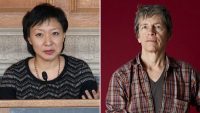
Two responses to the New Yorker’s recent sloppy, misbegotten hand-job on “conceptual poet” Kenneth Goldsmith fell within days of one another. The first response, by poet Cathy Hong Park, beautifully and powerfully grows in concentric circles from the personal (a defense of herself, her name, art, politics and aesthetic) that had been shrunken and misrepresented by writer Alec Wilkinson in his fawning, politically and aesthetically reactionary defense of his friend – never acknowledged as such in the piece – Goldsmith. Hong’s response gracefully moves from and transcends the personal to grapple with the shifting universal, the ways in which race, class, gender, sexuality and social justice, as they all intersect and feed one another in the twenty-first century, are invigorating the poetry landscape in ways that outrun and outwit the status quo – a status quo that often laughably positions itself as cutting-edge and subversive.
'That's not poetry; it's sociology!' – in Defence of Claudia Rankine's Citizen
by Adam Fitzgerald
At a recent reception following a poetry reading by elder, experimental poets, an academic critic – of decidedly avant-garde tastes – overheard that I had been teaching Claudia Rankine’s Citizen for the last four semesters. I knew, in fact, that this scholar’s life’s work centered around championing unsung postwar US poets such as Clark Coolidge and Susan Howe, who were difficult, acquired tastes (that I shared). Howe, for example, is known to publish textual sculptures often quite literally illegible. Who better, I thought, to appreciate my teaching of a complex poem like Citizen than this brainy, patient scholar. Yet quickly he fired off: “That’s not poetry; it’s sociology!” My spirits sank.
In Praise of James Fenton
by Julian Barnes

Poet, librettist, translator, essayist, journalist, poet, war correspondent, political columnist, foreign correspondent, poet, traveller, exile, theorist of Crepuscular Journalism (according to which sources become more trustworthy after dark), theatre critic, art critic, Oxford professor of poetry, historian of the Royal Academy, garden writer, poet, old friend of nearly 40 years – not, so far, thankfully, novelist – but poet, poet, poet …
Eileen Myles and Cathy Park Hong are taking poetry to the future.
Drafts & Fragments
The Kansas City and Toronto Libraries are Waging a Delightful Twitter War Using Book Spine Poetry
by Chris Landers
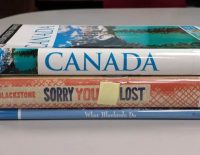
This year's ALCS is far more than just a clash between baseball teams and bat-flipping mayors. It's a battle of cultures — Canada vs. the Midwest; barbecue vs. poutine; and now, thanks to the wonders of Twitter, Toronto's public library vs. Kansas City's public library. It all began so innocently, with a perfectly pleasant greeting as the two teams were set to face off in Game 1.
I Moved Out of London Because TfL's Poems Are So Howlingly Awful
Like the lingering fart of a fat dog, it is impossible to ignore the poetry on the London Underground. There is something mind-numbingly awful about the posters that sit insultingly in trains and on the walls of Tube platforms. This city deserves better poetry because it would be impossible for its current batch to be any worse
Ted Hughes vs Philip Larkin – Whose Team Are You On?
by Theo Hobson
Are you a Phillist or a Teddist? A Phillist is not a Philistine in a hurry, but one who warms to the sensibility of Philip Larkin. A Teddist prefers that of Ted Hughes. Recent BBC documentaries on each poet have clarified the choice. Whose vision of life is more convincing and compelling – the glum librarian or the dashing naturalist who made the ladies swoon (in and out of ovens)? To define their difference it’s tempting to call Hughes a Romantic, and Larkin an anti-Romantic. But it doesn’t quite work.
The Kansas City and Toronto libraries are waging a delightful Twitter war using book spine poetry.
Poetry In the News
Does Poetry Hold the Key to Highly Secure Passwords?
The critical balance between security and memorability is famously elusive. Passwords tough enough to withstand an attack are impossible to memorize. The words and short phrases that agree to stay in our brains can be cracked in a matter of hours, if not minutes. From brilliant mathematicians to colorful cartoonists, some of our best minds have tried their hands at solving the persistent password problem. Where they came up short, USC computational linguists may have succeeded. Harnessing a time-honored method of memorization, Marjan Ghazvininejad and Kevin Knight from the USC Information Sciences Institute applied poetry to the problem.
Computational linguists recently applied poetry to the problem of memorizing difficult passwords.
New Books
Iconoscope: New and Selected Poems by Peter Oresick
[Paperback] University of Pittsburgh Press,144 pp., $16.95
![]()
Collected here are poems from Peter Oresick’s previous books, beginning with The Story of Glass (1977), and to them are added 36 new poems called Under the Carpathians. His work—known for working class and Catholic themes—probes labor and social history, post-World War II America, Eastern European identity, Eastern Rite Catholicism, and Russian icons and fine art and especially Pittsburgh-born pop art icon Andy Warhol.
Pedro Pietri: Selected Poetry by Pedro Pietri
[Paperback] City Lights Publishers, 254 pp., $18.95
Pedro Pietri's often playfully absurd poems chronicle the joys and struggles of Nuyoricans—urban Puerto Ricans whose lives straddle the islands of Puerto Rico and Manhattan—and define the Latino experience in urban America. By turns angry, heartbreaking, and hopeful, his writings are imbued with a sense of pride and nationalism and were embraced by the generation of Latino poets that followed him. Pedro Pietri: Selected Poetry gathers the most enduring and treasured work among his published books, Puerto Rican Obituary, Traffic Violations, and Out of Order, along with a generous selection of his previously unpublished works.
Insomnia: Poems by Linda Pastan
[Hardcover] W. W. Norton & Company, 96 pp., $19.23
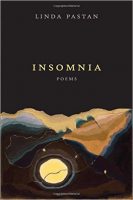
Incandescent poems about living and aging―about being awake in this young century―by one of our most moving and eloquent poets. These poems chart the journeys of sleepless nights when whole lifetimes seem to pass with their stories: loves lost and gained; children and seasons in their phases; and the world beyond, both threatening and enriching life. The time before sleep acts as an invitation to reflect on the world's quieter movements―from gardens heavy after a first storm to the moon slipping into darkness in an eclipse―as well as on the subtle but relentless passage of time. Insomnia embodies Linda Pastan's graceful and iconic voice, both lucid and haunting.
The Importance of Elsewhere: Philip Larkin's Photographs by Richard Bradford
[Hardcover] Frances Lincoln, 208 pp., $40.00
Philip Larkin was a keen amateur photographer and through his life he made images of the people, places and things that meant most to him. Publishing ahead of the thirtieth anniversary of the poet's death in December 2015, The Importance of Elsewhere gathers the best of Larkin's photographic work, divided into short thematic chapters arranged in chronological order.
Wild Nights: New & Selected Poems by Kim Addonizio
[Paperback] Bloodaxe Books,160 pp., $11.58

America's Kim Addonizio has been called 'one of the nation's most provocative and edgy poets'. Her poetry is renowned both for its gritty, street-wise narrators and for a wicked sense of wit. With passion, precision and irreverent honesty, her poems explore life's dual nature: good and evil, light and dark, joy and suffering, exposing raw emotions often only visible when truly confronting ourselves – jealousy, self-pity, fear, lust.
Kim Addonizio has been called ‘one of the America’s most provocative and edgy poets’.
Correspondences
Joy Harjo Speaks on Winning Poetry's Most Prestigious Award
by Alex Jacobs

Muscogee (Creek) poet Joy Harjo is the first ever Native to win the prestigious Wallace Stevens Award from the Academy of American Poets, which bestows the honor annually “to recognize outstanding and proven mastery in the art of poetry.” The poet, author, activist and performer, also a professor of English and American Indian Studies at the University of Illinois at Urbana-Champaign, lives in Tulsa, Oklahoma. On the day the prizes were announced, Harjo spoke with Indian Country Today Media Network about being chosen. Though she had known of her nomination for a few months, she told ICTMN, she was stunned to learn she had won.
In New Collection, Marin Poet Kay Ryan Contemplates Nuances of Loss
By Ryan Kost

Kay Ryan’s poetry stands on its own, separate, as she might put it, from any “autobiographical gloss.” If you read enough of her poems, say a dozen, you may learn some things about her, about the thoughts that occupy her mind, her wry sense of humor, her sly way with the words she chooses. You would not, however, learn about her dusty youth, the long bike rides she used to take that had her waking up dew-covered on the beach or the home she has made, tucked away in Marin.
How to Write a Poem About Baseball
by Julian Gewirtz

On the cover of Jill Bialosky’s fourth collection of poems, The Players, is a photograph of a boy in a red jersey standing on base, his weight poised on his right leg as he watches the play about to unfold. That double position of both spectator and participant is Bialosky’s, too. In these poems, whether her subject is her son’s baseball team or the generations of a family, she is a voyeur with skin in the game. Bialosky writes across many genres: her 2011 memoir History of a Suicide: My Sister’s Unfinished Life was a New York Times bestseller, and a third novel, The Prize, was published by Counterpoint in September 2015. She is an editor at W. W. Norton, and she has guided to publication recent books by poets as diverse as Eavan Boland, David Baker, and Major Jackson. When we met at Norton’s offices on an August afternoon to discuss her own new poems, Bialosky told me that she aims to write work that will be accessible to people who ordinarily might not read poetry.
Jill Bialosky on how to write a poem about baseball.
Envoi: Editor’s Notes
Wild Swans
And now for your end-of-October poem, although it stays up on my bulletin board year 'round:
The Wild Swans at Coole
William Butler Yeats
The trees are in their autumn beauty,
The woodland paths are dry,
Under the October twilight the water
Mirrors a still sky;
Upon the brimming water among the stones
Are nine-and-fifty swans.
The nineteenth autumn has come upon me
Since I first made my count;
I saw, before I had well finished,
All suddenly mount
And scatter wheeling in great broken rings
Upon their clamorous wings.
I have looked upon those brilliant creatures,
And now my heart is sore.
All's changed since I, hearing at twilight,
The first time on this shore,
The bell-beat of their wings above my head,
Trod with a lighter tread.
Unwearied still, lover by lover,
They paddle in the cold
Companionable streams or climb the air;
Their hearts have not grown old;
Passion or conquest, wander where they will,
Attend upon them still.
But now they drift on the still water,
Mysterious, beautiful;
Among what rushes will they build,
By what lake's edge or pool
Delight men's eyes when I awake some day
To find they have flown away?